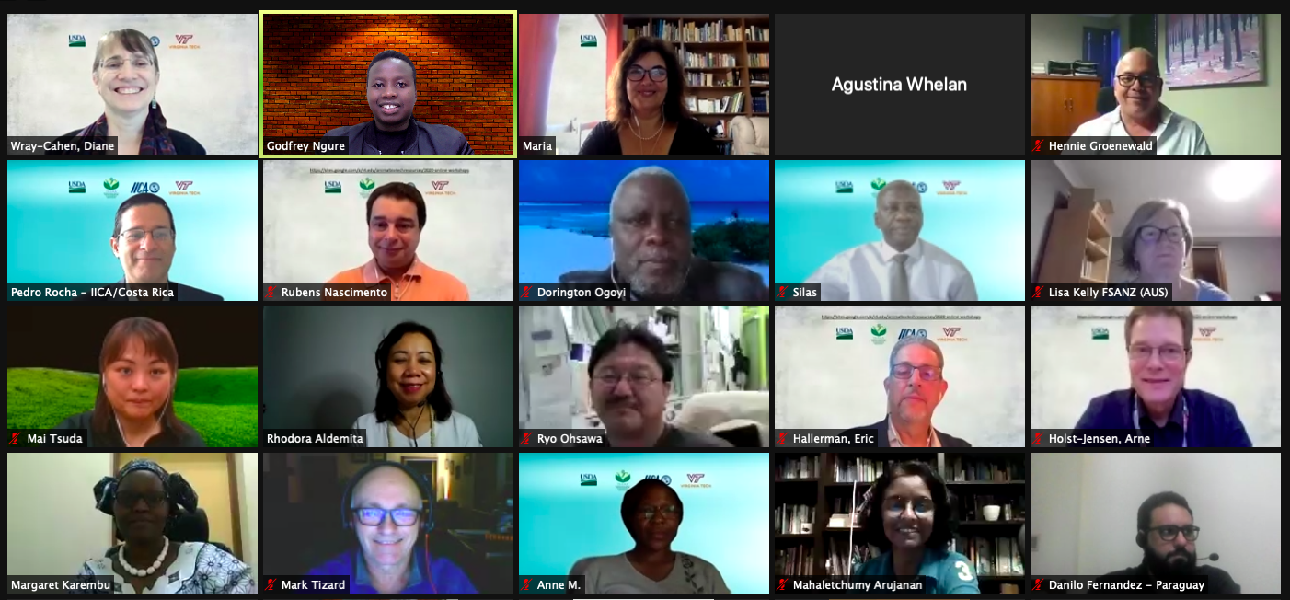
Animal Biotech Online Discourses Cover Genome Editing Regulatory Approaches
September 30, 2020| |
Session 2 of the 4th International Workshop on Regulatory Approaches for Animal Biotechnology was successfully held on September 23 to 24, 2020, with around 167 participants from around the world in attendance. This is the second for four sessions completed for the event that started early in September 2020 and is held every two weeks. The last session is scheduled on the third week of October 2020.
Session 2 focused on the status of regulatory approaches for genome-edited animals. The first day began with country reports on genome editing regulations and product statuses from Australia-New Zealand, Argentina, Brazil, Japan, and Norway, followed by a regional overview from Africa and country reports from Kenya and South Africa. Day 1 was capped off by a presentation on the use of the regulatory process for commercialization and determination of genome-edited animals co-presented by Dr. Agustina Whelan of the National University of Quilmes in Argentina and Dr. Maria Dagli of the University of Sao Paulo in Brazil.
Day 2 of Session 2 focused more on regulations, beginning with an overview of the Cartagena Protocol and its implications on genome editing presented by Dr. Martin Lema, also from the National University of Quilmes. This was followed by the genome editing on animal biotech perspectives and experiences from the industry by Dr. Clint Nesbitt of the Biotechnology Innovation Organization. Day 2 also included a productive discussion by the panel who answered questions from the audiences ranging from the difference and similarities of genetically modified and genome-edited animals, off-target insertions, point mutations, and the public's perception on genome editing.
Sessions 3 and 4 of the online webinars are scheduled on October 7-8, 2020, and October 19-22, 2020 respectively. The environmental safety aspects of regulations for genetically engineered animals for confined use and environmental release will be covered during Session 3, while Session 4 will be used for breakout sessions of the participants to synthesize all the topics and discussions made during the first three sessions.
To know more about the last two sessions, please contact mkarembu@isaaa.org.
| |
You might also like:
- ISAAA Kicks Off Discourses on Regulatory Approaches for Animal Biotech
- Animal Biotech Offers Potential in Addressing Food Insecurity
- Filipino Regulators Learn from International Experts in Regulating Animal Biotech Products
Biotech Updates is a weekly newsletter of ISAAA, a not-for-profit organization. It is distributed for free to over 22,000 subscribers worldwide to inform them about the key developments in biosciences, especially in biotechnology. Your support will help us in our mission to feed the world with knowledge. You can help by donating as little as $10.
-
See more articles:
-
News from Around the World
- Animal Biotech Online Discourses Cover Genome Editing Regulatory Approaches
- Science and Scientists Held in High Esteem Across the World
- Review Says Farmer Knowledge Key to Finding More Resilient Crops
- Myanmar Scientists, Academics Step Up for Biotechnology Information Portal Launch
- Research Team to Genetically Improve Millet for Large-Scale Agriculture in Saudi Arabia
- Researchers Find Way to Protect Plants from Fungal Infection
-
Research Highlights
- Researchers Overexpressed Transcription Factors to Improve Cotton Lint Yield
-
Plant
- Detection of Off-Target Effect in Genome Editing by Integration-Defective Lentiviral Vector
- Gene Editing of SlLBD40 Improves Drought Tolerance in Tomato
- Researchers Engineer a Rapid TALEN Assembly Protocol for Genome Editing
-
Health
- Sewage Testing Shows Prevalence of COVID-19 Infection
- Farmers Highly Vulnerable to COVID-19, Says Study
-
Read the latest: - Biotech Updates (December 17, 2025)
- Gene Editing Supplement (December 17, 2025)
- Gene Drive Supplement (February 22, 2023)
-
Subscribe to BU: - Share
- Tweet

